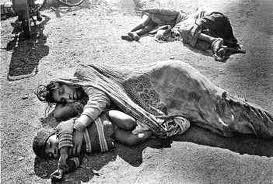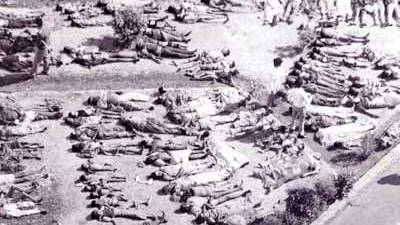Dec. 3, 1984: Bhopal - Worst Industrial Accident in History
Source: wired.com
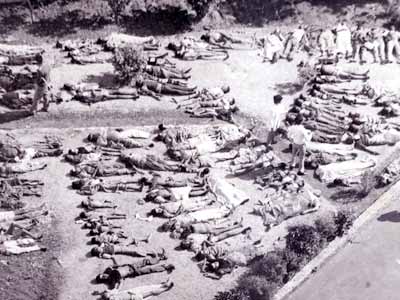
1984: Poison gas leaks from a Union Carbide pesticide factory in Bhopal, India. It spreads throughout the city, killing thousands of people outright and thousands more subsequently in a disaster often described as the worst industrial accident in history.
Union Carbide chose Bhopal, a city of 900,000 people in the state of Madhya Pradesh, because of its central location and its proximity to a lake and to the country’s vast rail system.
The plant opened in 1969 and produced the pesticide carbaryl, which was marketed as Sevin. Ten years later the plant began manufacturing methyl isocyanate, or MIC, a cheaper but more toxic substance used in the making of pesticides.
It was MIC gas that was released when water leaked into one of the storage tanks late on the night of Dec. 2, setting off the disaster. Gas began escaping from Tank 610 around 10:30 p.m., although the main warning siren didn’t go off for another two hours.
The first effects were felt almost immediately in the vicinity of the plant. As the gas cloud spread into Bhopal proper, residents were awakened to a blinding, vomiting, lung-searing hell. Panic ensued, and hundreds of people died in the chaotic stampede that followed.
An exact death toll has never been established. Union Carbide, not surprisingly, set the toll on the low end at 3,800, while municipal workers claimed to have cleared at least 15,000 bodies in the immediate aftermath of the accident. Thousands have died since, and an estimated 50,000 people became invalids or developed chronic respiratory conditions as a result of being poisoned.
Regardless of the numbers, all evidence pointed to Union Carbide and its Indian subsidiary (as well as the Indian government, its partner in the factory) being responsible for what occurred — mainly through negligence. Despite the extreme volatility and toxicity of the chemicals in use at the factory, safeguards known to be substandard were ignored rather than fixed.
In the subsequent investigations and legal proceedings, it was determined, among other things, that:
-Staffing at the plant had been cut to save money. Workers who complained about codified safety violations were reprimanded and, occasionally, fired.
-No plan existed for coping with a disaster of this magnitude.
-Tank alarms that would have alerted personnel to the leak hadn’t functioned for at least four years.
-Other backup systems were either not functioning or nonexistent.
-The plant was equipped with a single backup system, unlike the four-stage system typically found in American plants.
-Tank 610 held 42 tons of MIC, well above the prescribed capacity. (It is believed that 27 tons escaped in the leak.)
-Water sprays designed to dilute escaping gas were poorly installed and proved ineffective.
-Damage known to exist to piping and valves had not been repaired or replaced, because the cost was considered too high. Warnings from U.S. and Indian experts about other shortcomings at the plant were similarly ignored.
The aftermath of the disaster was almost as chaotic. Union Carbide was initially responsive, rushing aid and money to Bhopal. Nevertheless, faced with a $3 billion lawsuit, the company dug in. It eventually agreed to a $470 million settlement, a mere 15 percent of the original claim. In any case, very little money ever reached the victims of the disaster.
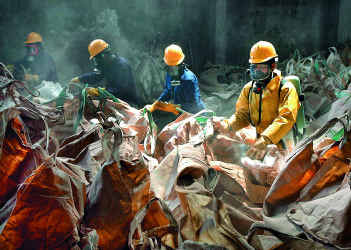
Union Carbide CEO Warren Anderson went before Congress in December 1984, pledging his company’s renewed commitment to safety. That promise rang hollow in India — and probably to Congress as well.
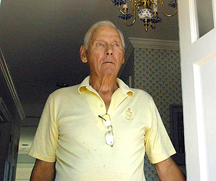 Anderson [left] was subsequently charged with manslaughter by Indian prosecutors but managed to evade an international arrest warrant and disappeared. Investigators from Greenpeace, which has kept up an active interest in the case, found Anderson in 2002, alive and well and living comfortably in the Hamptons. India issued an arrest warrant for Anderson in 2009, but the United States has shown no inclination to hand him over to Indian justice.
Anderson [left] was subsequently charged with manslaughter by Indian prosecutors but managed to evade an international arrest warrant and disappeared. Investigators from Greenpeace, which has kept up an active interest in the case, found Anderson in 2002, alive and well and living comfortably in the Hamptons. India issued an arrest warrant for Anderson in 2009, but the United States has shown no inclination to hand him over to Indian justice.Union Carbide, meanwhile, was acquired by Dow Chemical in 2001, which refused to assume any additional liability for Bhopal, arguing that the debt had already been paid through various court settlements. It did go on to settle another outstanding claim against Union Carbide, this one for $2.2 billion made by asbestos workers in Texas.
In June 2010, seven former employees of Union Carbide’s Indian subsidiary were found guilty of death by negligence. They were fined about $2,000 each and sentenced to two years’ imprisonment, then released on bail.
The victims of the disaster, those who live on, continue dealing with various health problems — including chronic respiratory problems, vision problems and an increased incidence of cancer and birth defects — and an environment that remains contaminated to this day.
Article from: wired.com
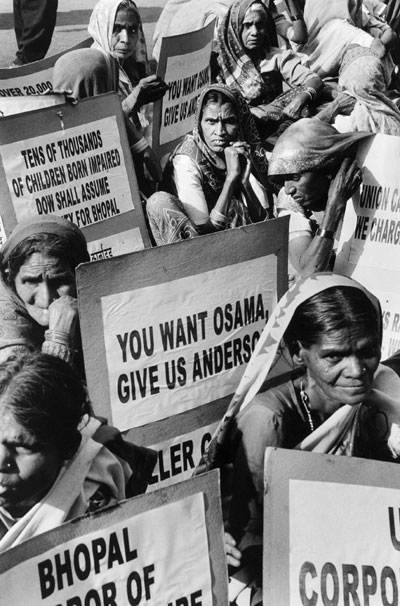
Bhopal gas tragedy: Nothing has changed!!!
By Sush Jaitly | MakeSplash.com
I was in my eighth standard when this tragedy happened. I still remember our principal Mrs Neelima Sahay and a few other teachers were crying on that day during the morning assembly. Even as tears rolled down down her cheeks Mrs Sahay informed us about this tragedy and asked us to observe a minute’s silence for the departed souls. At the end of that one minute Mrs Sahay said, “KYA HOGA IS DESH KA!!!” meaning - What will happen to this country!
Coming from a strict disciplinarian who never showed her emotions this was a first and it conveyed a lot. No classes were held that day. Mrs Sahay died a few years later.
Though I was still in my formative years when this happened but I guess I was old enough to understand the scale of the horrific accident. The very fact that I still remember that day quite explicitly, possibly shows that I was. Mrs Sahay is long gone but those words still keep ringing in my years- KYA HOGA IS DESH KA! And even after twenty six years of the incident that one sentence still holds so true.
There is hardly any point of discussing the wrongs committed by successive Indian govts in the past. Be it the Congress or BJP, they’ve all conspired to let the Americans get away, as a favor or for money. But in the decades gone by we were small time push overs who were only envisaged as a country of poor people and naked saints. Nobody gave a damn to what happened to India and Indians. But tell you what? We need not live in the past. What matters is today. Are we still the same push overs who still do not matter? Is our legal system still the same which permitted Warren Anderson to escape from the country? These are the questions which face us today. And we have the answers to both these questions.
Yes, we are the same push overs who still do not really matter. There is still no comparison between the cost of life of an Indian and that of an American. it doesn’t really matter if the perpetrator of the crime which resulted in deaths of nearly twenty thousand innocents is an American company. A clear indicator to that is the statement coming out of White House that this case is now an internal matter of India. By extension it means that Warren Anderson will never be extradited or tried for crimes he committed. By extension it also means that Dow Chemicals, who have since bought Union Carbide, will not pay a dime more as compensation.
Compare this with the statement of Barrack Obama after the BP oil spill in Gulf of Mexico in which eleven lives have been lost where he says that he will not allow BP to get away without paying every dime that they ought to, to not just families of victims but also to compensate all those people of Louisiana who have suffered financial losses because of this spill. Pertinent to mention BP has a liability cap of $75 million dollars but Obama says that he does not care what the cap is. Fair enough, I’d say.
But then why have different standards for people of other countries? Is twelve thousand rupees that have been given to the victim’s next of kin enough for the life of an Indian? And we are not even talking of financial losses here. Like I said, nothing has changed for us in the last twenty six years. [...]
HOGA IS DESH KA!!
Read the full article at: makesplash.com
